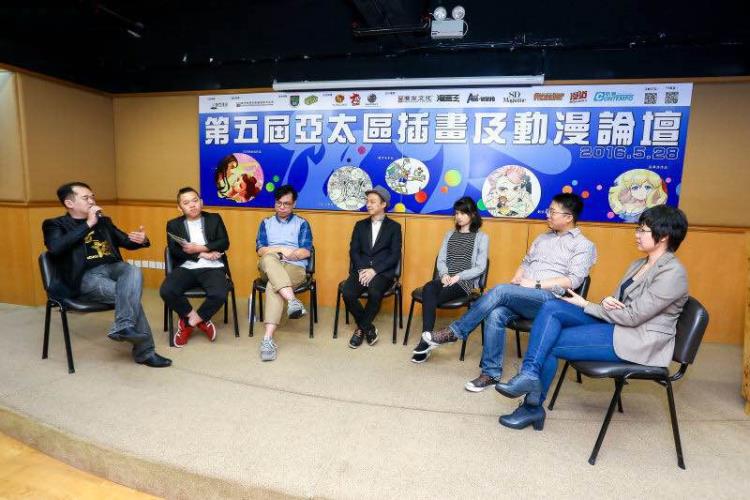An accountant by profession, Ashley is member of several anime and comics associations in Macao. She started writing fiction, illustrated and drew the comic strip of Macao Daily in the early 1990s. Later on she took the role of comics writer, and she is now the managing editor of MIND², a comics magazine published by Comic’s Kingdom. Ashley also participates in organising the Macao Animation, Comic and Toy Expo, an event run by Macao Animation & Comic Alliance.

Photo courtesy of Macau Comickers Association Fifth Asia-Pacific Illustration and Animation Forum
It is a well-known fact that out of various reasons, the government’s subsidy policy for civil organisations and convention and exhibition projects was slightly tightened and adjusted over the past two years. Anime groups are naturally affected, and some larger-scale projects were approved less subsidy amount than they applied for. Certainly, authorities have their own logical thinking and behaviour patterns, and related groups can do nothing but to accept it.
Thinking back to the last century, in order to fulfill their dreams, anime enthusiasts in the city used their own money to print and release [animes]. Although living from hand to mouth, they enjoyed themselves. Until a few years ago, our city followed national policy and included anime into the cultural and creative industries. All of a sudden, it became extremely popular, and has since linked up with the society’s diversified development. The government established dedicated management departments to formulate policies and allocate resources, while the society is busy seizing opportunities. All sorts of projects and plans blossomed, and those who are more courageous boldly came forward and hoped to make use of existing favourable conditions to create large-scale anime brands that belonged to Macao, establishing a new milestone for the history of Macao’s anime.
Neighbouring regions certainly have the practice of their government supporting the anime industry. Locals in the industry think that what the government needs to do is to assist creators and the quality of work, which is better than investing money to build hardware, such as a base for anime.
If Macao anime was to be industrialised, it is without doubt that Macao must first come up with presentable product/works. Despite having promising anime creators, Macao’s ecology of letting amateurs fend for themselves for the past decades cannot be transformed into a professional status in two or three years’ time with several policies and fundings. It is not difficult for creators to receive modest subsidies and combine them with some of their own money to publish offprints, organise exhibitions, run art fairs and entertain others and themselves. However, such scale mainly gears towards industry insiders and direct customers, and the impact is limited after all.
Many mainland cities have large-scale anime events for their own brands covering almost the whole of the year. Regardless of the quality, they have at least stimulated momentum and atmosphere, creating wide impact. Apart from being the paradise for anime lovers, these events are also attracting professional exhibitors and are geared towards professional audiences, integrating information with business opportunities. For Macao, the role and significance of organising these transregional animation events with a certain scale, such as forums and expos is definitely not to compare with other regions or catch up with the upsurge of the convention and exhibition industry. With the rapid transformation and progress of the society, anime is no longer thin comic books and cartoons for children. Looking from the artistic or commercial perspective, it has limitless develop potential, and indefinite possibilities for trans-sector collaboration with other industries, which have been proven by numerous examples; large-scale events attract attention, showcase local and foreign industrial situation and development prospects, build up a passionate atmosphere and forge the sense of belonging and recognition of all parties. Creators, audiences and readers can broaden their horizons through these events, explore their thinkings, be inspired and enhance their levels of creation and appreciation; this is not mere beautiful words written on application forms for subsidies, nor “spoiling things through excessive enthusiasm”. Instead, the events are pergolas for the growth of seedlings. Since it takes time for talent cultivation and product maturation, why not simultaneously put effort in building spaces and hardware?
In Macao, anime or culture and creativity is after all different from other mature industries with commercial organisations of solid foundations that have sufficient resources to participate in and organise exhibitions, expand markets and seek profits. Instead, they need support to a certain extent in the foreseeable future; it is unrealistic to expect amateurs to invest millions to organise large-scale events and sustainably pave the way for diversified social development. The change in policy has undoubtedly hindered the progressing path of the industry, put it in a dilemma, and almost undid all previous efforts, bringing everything back to basic. We are all on the fence and temporarily returned to our previous comfort zone. As for industrialisation, it has been restored to a concept, or even suspense.